How tos & videos
Guides & videos from Muddy Faces & others for making & using a variety of outdoor hand washing kit.
Read More about How tos & videosWe discuss some of the points to consider when choosing a hand washing system such as: effectiveness, ease of use, water flow & taps, capacity, waste water disposal, health & hygiene, cost, do-it-yourself, space and longevity.
We also compare portable mains free systems (low capacity), non mains connected systems (low and mid capacity) and mains connected systems.
Ask: Does it work? Will it support your setting in the correct way?
Watch out for cheap systems that have not been built or engineered robustly/drips or leaks that mean there won't be enough water available when needed.
Ask: Is the station the correct height for the user? Is the water outlet in a comfortable place? If it is too high water will run past the elbows soaking clothing, and if it is too low then it will be awkward to use. Ensure the child doesn’t have to reach excessively to rinse their hands.
Using systems that are not connected to the mains requires a balance between water conservation & having enough flow to wash hands effectively. Be aware that a tap without an auto close could be left on, allowing all the water to run out. A foot pump is ideal as there is no need for hands to touch taps. Some foot pumps require a certain amount of strength. Ask: Can younger children use a foot pump system independently?
One of the main considerations if you are increasing your hand washing provision and using a non mains connected system is capacity. A larger capacity system needs to be filled up & emptied much less often than a smaller capacity tank.
| capacity (ltr) | Number of 200ml 10 second washes |
|---|---|
| 1 | 5 |
| 3 | 15 |
| 10 | 50 |
| 35 | 175 |
| 50 | 250 |
Different systems release different amounts of water. This chart compares different capacity systems based on a 200ml 10-second wash. If the system releases more water on each wash the number of washes will decrease, and vice versa.
Ask: How is the waste water removed if it flows to a tank? The larger the tank capacity the less often it will need to be emptied. But if the tank is too large it can be heavy to transport & empty.
Ask: What is the system made out of? Some materials are better for supporting virus reduction, such as non absorbent surfaces like stainless steel or plastic.
Ask: Is it easy to clean and are parts removable & wipeable? Does it have a cover to help it stay clean when not in use?
Your budget will dictate what systems you can purchase, but you could surprise yourself with a little ingenuity. If you are feeling creative you could create a cheap system that works really well for your setting using recycled items.
A well-known system that is used all over the world is the Tippy tap - there are plenty of ‘how to’ videos on the internet to make your own.
Juliet Robertson from creativestarlearning.co.uk has a useful blog exploring hand hygiene outdoors particularly if you are heading offsite. In it she highlights an inexpensive washing line system using a spa tap. The children move along the line from left to right.
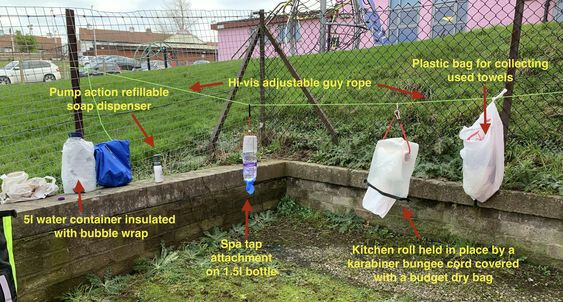
For more information look at the sections below:
How tos & videos
Guides & videos from Muddy Faces & others for making & using a variety of outdoor hand washing kit.
Read More about How tos & videosPublications & useful resources
A selection of guides, reports and other useful resources addressing hand washing outdoors.
Read More about Publications & useful resourcesThe space you have may dictate what systems you can use. Ask: How far away is your water source for filling tanks and emptying waste?What is the ground like - will it get muddy if water is spilt frequently on it?
The system needs to be robust enough to handle frequent hand washing. If it is cheap or not designed for purpose you may find you are
replacing the system frequently.
The number of ideas, products & systems for hand washing are increasing all the time, with many options for different budgets. Most of these options are available from Muddy Faces.
There are some clever devices, specifically designed to enable effective hand washing where there is limited water supply. These work really well if you are travelling or have a small group.
A fab ultra-light (just 82gms) invention made from highest quality UV-stable, food & water-safe flexible silicone. It can be squashed down very small and attached to different sizes of bottles, transforming them into a flow-controllable water-saving tap.
Hang it on a tree or fence with the hook and loop strap for quick, easy hand washing. It can even be attached to a big watercooler bottle to give a large capacity option.
Disadvantages: It fits some bottles better than others. This juice bottle (above) fitted perfectly but a 2ltr pop bottle with a wide top didn’t fit as well, letting air in and making it drip. You need to touch the plug to switch the tap on and off.
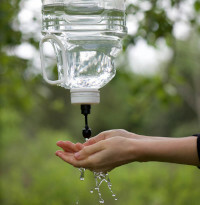
A really nifty gadget made from high quality durable materials, which can be used in various ways:
A. Use the internal cutting device to cut a perfect hole in the lid of a bottle then attach the tap to the lid. Fill the bottle, attach the lid and tap, turn upside down and you have an instant hand washer.
B. Attach it to a solar shower for a warm wash.
C. Simply use the cutter to cut a hole in a container and hang it up.
The SaveAqua Tap works by pushing up with the back of your hand, releasing the water over the tap, rinsing any contaminants away. When you remove your hand the tap drops down to block the flow and the water stops. It's easy to use and very effective. We've seen devices like this before but they were poorly made and dripped, but the SaveAqua Tap is well-engineered and we had no drips at all in our testing. It was designed to save water and releases the ideal amount to wash your hands without wasting water.
Disadvantages: It has a cutting device in it under a screw top. But if you do not want or require the cutting device it can be removed with pliers
and/or the cap glued shut
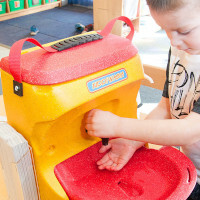
Portable, robust and easy to clean, this is specifically-designed to provide an effective and fun hand wash.
It’s entirely self-contained: just fill with warm water and the KiddiWash Xtra will keep the water warm for hours. The lightweight flippi-tap is perfect for little fingers, enabling children to activate a steady spray of warm water that’s the perfect temperature for hand washing every time – both indoors and out!
Disadvantages: It's capacity is on the lower range, requiring it to be refilled and emptied more often than larger units.
There are a number of different items in this mid capacity (15-30ltr) range, most of which are not designed specifically for hand washing but do a good job. Separate waste collection will need to be organised as well as a way to minimise cross contamination from taps.
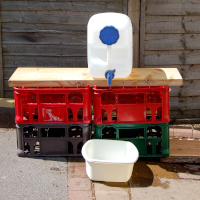
A jerry can with a tap is a very cheap option. You can usually increase and decrease the flow. A good quality jerry can is robust and designed to be transported around.
Disadvantages: The taps can be a bit stiff and tricky to use for independent hand washing, plus you have to touch the tap to turn it on and off
Solar showers are flexible and roll up small. They can be 20-40ltr in capacity and are designed to add some warmth to the water if the sun is shining. They can be hung up at a convenient height. On some makes the shower pipe can be cut down to turn it into a hand wash. The tap allows flow to be increased or decreased. Different brands have different tap mechanisms, some better than others.
We have found that Mil-Tec camp showers have an easy-to-use tap and a SaveAqua Tap can be added to create a touch-free system if you wish.
Disadvantages: They are designed to warm water but they can struggle in the UK weather. On the other end of the scale, if it is very sunny the water
can get very hot, so always check temperature before use.
Different brands range significantly in price. Of the better quality brands, Igloo dispensers are one of the cheaper ones on the market. This yellow range is available in 11, 19 & 38ltrs capacities. They are designed for keeping drinking water cool but some settings use them as hand washing systems, using the thermal capacity to keep water warm. The corded lid prevents heat loss and maintains hygiene. The handles are reinforced to provide extra strength.
Disadvantages: The push button tap is quite tricky to use for hand washing but you can unscrew it and swap the tap it comes with for a different flip-style tap that would work better. Larger tanks are heavy and need to be placed on a very stable surface.
This system is designed and created by Muddy Faces, specifically for educational and outdoor settings.
Has a massive tank that requires no connection to the mains and the easy-use foot pump system allows you to wash your hands with no hand contact and therefore little opportunity for cross contamination.
The unique pump system has been designed to make the flow of the water just right for hand washing and reduces unnecessary water consumption. The unique pump design requires only light foot pressure making it ideal for children and people with limited physical strength. Our systems can be placed on a sturdy table or a wall. A fence/tree pump system is great if space is tight but may only be suitable for older children who can use the foot pump.
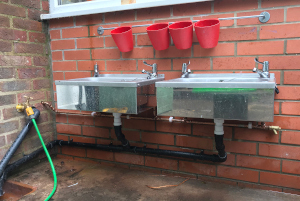
The simplest of these options is a hose over a drain, very easy to install and even better if you can run warm water through the hose and attach a SaveAqua Tap.
A permanent outdoor sink plumbed to the mains is at the upper end of the budget scale but is a very effective solution, especially if warm water can also be plumbed in and suitable drainage built in as well. Having a sink installed means you can have it built at the correct height for children and you can choose a tap system that they can use independently.
A mains connected mobile unit would be another option at the higher end of the budget scale. The main problem with these is that they are adult height and not effective to use with small children. They also require mains and drainage, and some also require mains electricity, which opens up more complications. If looking at these options, make sure the units are suitable for the outdoors.
Increased use of water and its safe disposal, and increased use of disposables such as PPE and hand towels.
If you plan to run your outdoor hand washing directly into the drain you need to check what type of drain it is first. Drains are underground pipes that take water away from your buildings, they can be combined or separate.
A single pipe collecting your wastewater and rainwater runoff. Properties built before 1970 are likely to have a combined drains system.
Rainwater is untreated. It's also described as 'storm water'. The surface water drain takes it directly to rivers and beaches. The drain for
rainwater collects rainwater from roofs, driveways and roads.
The wastewater drain takes foul water to the local wastewater treatment works. Wastewater comes from toilets, sinks, baths and showers, washing machines, dishwashers, etc. Most properties built since 1970 have separate drains for rainwater and wastewater.
If you run detergents or soap into the rainwater drain, you could be causing water pollution.
Going to the loo & hygiene outside
How-tos, guides & tips for spending time and spending a penny (or more!) outdoors safely & hygienically.
Read More about Going to the loo & hygiene outside
Outdoor clothing
Appropriate, effective outdoor clothing is crucial to support rich & satisfying outdoor play and learning in Early Years, Primary & Secondary schools. The only thing as important is the attitudes of the adult supervisors and the setting.
In this section you'll find waterproof ratings explained; guides to buying, clothing care & layering; and how to get your group ready for warm, dry times outdoors.
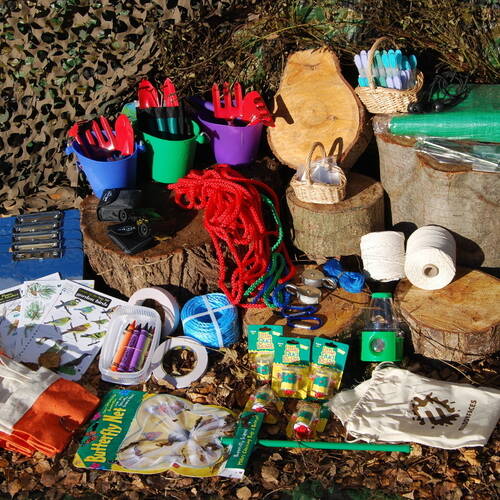
Forest School kit lists
The most essential part of Forest School is the outdoors & FS leaders, with appropriate clothing a close second. But after that there are many resources that can support your outdoor play and learning with Early Years and Primary Schools. Some bits of kit will sustain many different activities and explorations.
We asked the experts to recommend their favourite bits of kit and what they just couldn't do without. And we're sharing some kit lists that schools and projects have created for themselves. Thank you to all of them for their generosity in sharing their experience with our outdoor community.
Read More about Forest School kit lists